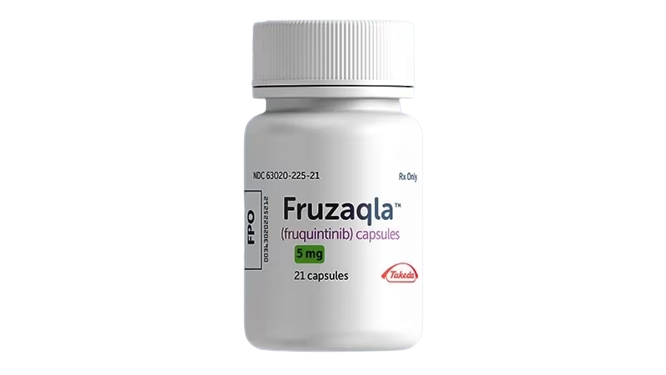Keytruda (pembrolizumab) vs Fruzaqla (fruquintinib)
Keytruda (pembrolizumab) vs Fruzaqla (fruquintinib)
Keytruda (pembrolizumab) is an immune checkpoint inhibitor that works by blocking the PD-1 pathway, thereby enhancing the body's immune response against cancer cells, and is widely used for various types of cancers, including melanoma, lung, and head and neck cancers. Fruzaqla (fruquintinib) is a small molecule drug that inhibits vascular endothelial growth factor receptors (VEGFR), which are involved in tumor angiogenesis (the growth of new blood vessels that feed a tumor), and is used for the treatment of colorectal cancer in China. The choice between Keytruda and Fruzaqla would depend on the specific type of cancer a patient has, the stage of the disease, the patient's overall health, and the treatment guidelines, which a healthcare provider can help interpret to make the best decision for the patient's individual situation.
Difference between Keytruda and Fruzaqla
| Metric | Keytruda (pembrolizumab) | Fruzaqla (fruquintinib) |
|---|---|---|
| Generic name | Pembrolizumab | Fruquintinib |
| Indications | Various types of cancers including melanoma, lung cancer, head and neck cancer, Hodgkin lymphoma, and others | Metastatic colorectal cancer |
| Mechanism of action | Programmed death receptor-1 (PD-1) blocking antibody | Vascular endothelial growth factor receptor (VEGFR) inhibitor |
| Brand names | Keytruda | Fruzaqla |
| Administrative route | Intravenous infusion | Oral |
| Side effects | Fatigue, musculoskeletal pain, decreased appetite, pruritus, diarrhea, nausea, rash, pyrexia, cough, dyspnea, constipation, pain in extremity, and headache | Hypertension, hand-foot syndrome, fatigue, proteinuria, diarrhea, decreased appetite, neutropenia, thrombocytopenia, nausea, and stomatitis |
| Contraindications | Individuals with hypersensitivity to pembrolizumab or any of its excipients | Individuals with hypersensitivity to fruquintinib or any of its excipients |
| Drug class | Anti-PD-1 monoclonal antibody | Tyrosine kinase inhibitor |
| Manufacturer | Merck & Co. | Hutchison MediPharma Limited |
Efficacy
Keytruda (Pembrolizumab) Efficacy in Colorectal Cancer
Keytruda, known generically as pembrolizumab, is a monoclonal antibody that has shown efficacy in treating certain types of colorectal cancer. Specifically, it is indicated for the treatment of patients with unresectable or metastatic colorectal cancer that has high microsatellite instability (MSI-H) or mismatch repair deficiency (dMMR). These biomarkers are present in a subset of colorectal cancers and indicate a greater likelihood of response to immunotherapy. Clinical trials have demonstrated that pembrolizumab can lead to significant tumor shrinkage and prolonged progression-free survival in patients with MSI-H or dMMR colorectal cancer.
The efficacy of Keytruda in this patient population is underscored by its ability to harness the body's immune system to fight cancer cells. By blocking the interaction between PD-1, a protein on the surface of immune cells, and its ligands, PD-L1 and PD-L2, pembrolizumab enhances the immune response against cancer cells. This mechanism of action has proven to be a valuable addition to the therapeutic arsenal against colorectal cancer, offering hope to patients who have limited treatment options.
Fruzaqla (Fruquintinib) Efficacy in Colorectal Cancer
Fruzaqla, with the active ingredient fruquintinib, is a novel small molecule drug that targets the vascular endothelial growth factor (VEGF) pathway, a key system involved in angiogenesis, the formation of new blood vessels that supply tumors with nutrients and oxygen. Fruquintinib is a highly selective inhibitor of VEGFR-1, VEGFR-2, and VEGFR-3. Clinical trials have shown that fruquintinib is effective in treating patients with metastatic colorectal cancer who have previously failed at least two lines of systemic chemotherapy. The drug has demonstrated an improvement in overall survival and progression-free survival when compared to placebo.
The efficacy of Fruzaqla as a third-line treatment for metastatic colorectal cancer highlights its potential role in managing this challenging condition. By inhibiting the VEGF pathway, fruquintinib effectively disrupts the tumor's blood supply, which is critical for its growth and survival. The clinical outcomes associated with fruquintinib suggest that it could be an important therapeutic option for patients with advanced colorectal cancer, providing a new avenue for those who have exhausted other treatments.
Regulatory Agency Approvals
Keytruda
-
European Medical Agency (EMA), European Union

-
Food and Drug Administration (FDA), USA

-
Health Canada

-
Therapeutic Goods Administration (TGA), Australia

-
Medsafe (NZ)

Fruzaqla
-
Food and Drug Administration (FDA), USA

Access Keytruda or Fruzaqla today
If Keytruda or Fruzaqla are not approved or available in your country (e.g. due to supply issues), you can access them via Everyone.org.
How it works

Make an enquiry
Choose the medicine you want to buy, answer a couple of questions, and upload your prescription to speed things up. We’ll get back to you within 24 hours.


Make an enquiry
Choose the medicine you want to buy, answer a couple of questions, and upload your prescription to speed things up. We’ll get back to you within 24 hours.


Breeze through the paperwork
We'll guide you through the required documents for importing unapproved medicine, ensuring you have all the necessary information.


Get a personalized quote
We’ll prepare a quote for you, including medicine costs and any shipping, administrative, or import fees that may apply.


Receive your medicine
Accept the quote and we’ll handle the rest - sourcing and safely delivering your medicine.

Some text on this page has been automatically generated. Speak to your physician before you start a new treatment or medication.
Let's talk
If you have any questions, call us or send us a message through WhatsApp or email:
Contact us




